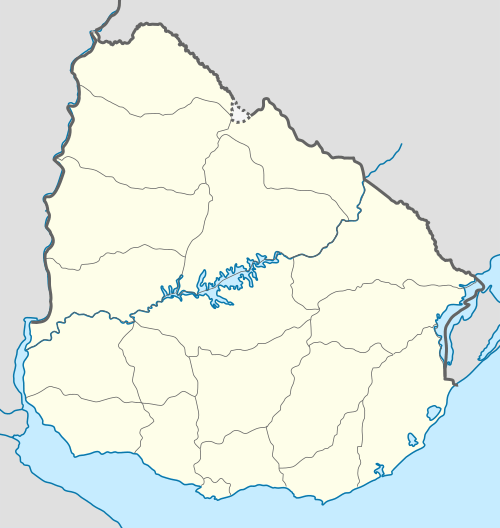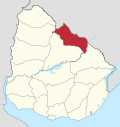Tranqueras
Tranqueras is a city in the Rivera Department of northeastern Uruguay.
Tranqueras | |
|---|---|
City | |
 Tranqueras Location in Uruguay | |
| Coordinates: 31°11′0″S 55°46′0″W | |
| Country | |
| Department | |
| Population (2011 Census) | |
| • Total | 7,235 |
| Time zone | UTC -3 |
| Postal code | 40001 |
| Dial plan | +598 4656 (+4 digits) |
Location
The city is located on Route 30, about 53 kilometres (33 mi) (via Routes 5 and 30) south-southwest of Rivera, the capital city of the department.
History
During the first decades of the 19th century the area was known as Paso de Tranqueras because of the homonymous bridge over the Tacuarembó Grande river. In 1890 the French Marcos Bourré donated to the state some land for the construction of a railway station. The arrival of the railway became the birth point of a village which grew rapidly with hotels, stores and small industry.[1]
On 22 July 1914 it was declared a "Pueblo" (village) by the Act of Ley Nº 5.107,[2] and on 15 October 1963, its status was elevated to "Villa" (town) by the Act of Ley Nº 13.167.[3] Finally, on 13 December 1994 its status was elevated to "Ciudad" (city) by the Act of Ley Nº 16.667.[4]
Population
In 2011 Tranqueras had a population of 7,235.[5] This makes it the second largest populated place of the department.
| Year | Population |
|---|---|
| 1908 | 4,973 |
| 1963 | 3,658 |
| 1975 | 4,097 |
| 1985 | 4,469 |
| 1996 | 5,792 |
| 2004 | 7,284 |
| 2011 | 7,235 |
Source: Instituto Nacional de Estadística de Uruguay[2]
Places of worship
- Sacred Heart Parish Church (Roman Catholic)
References
- "Rivera". El Observador. 2011. Retrieved 26 February 2012.
- "Statistics of urban localities (1908–2004)" (PDF). INE. 2012. Retrieved 4 September 2012.
- "LEY N° 13.167". República Oriental del Uruguay, Poder Legislativo. 1963. Archived from the original on 7 January 2013. Retrieved 12 July 2011.
- "Ley Nº 16.6679". República Oriental del Uruguay, Poder Legislativo. 1994. Retrieved 4 September 2012.
- "Censos 2011 Cuadros Rivera". INE. 2012. Archived from the original on 23 November 2012. Retrieved 25 August 2012.
